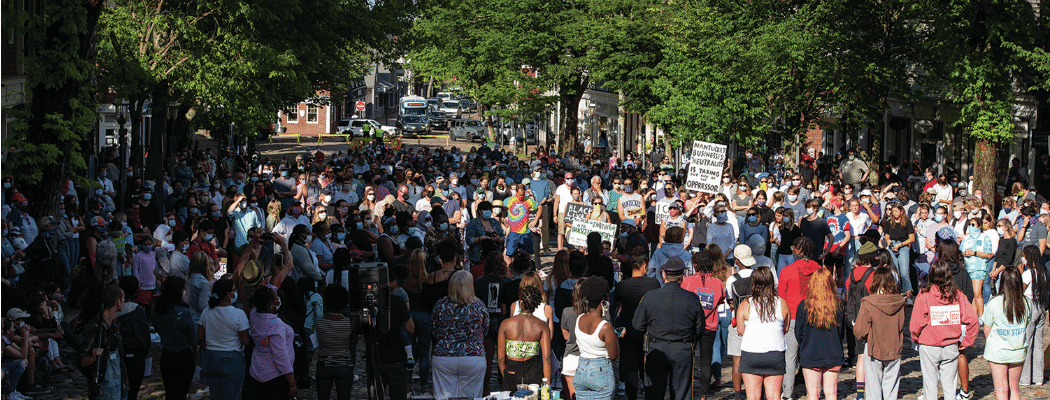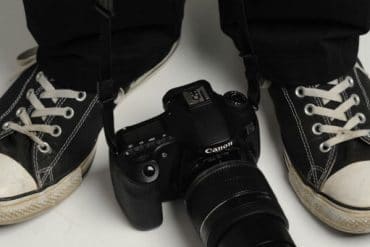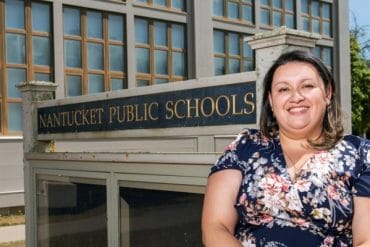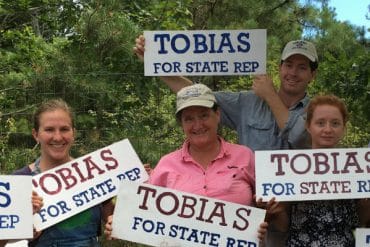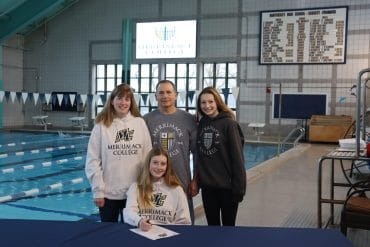A community calls for answers in the African Meeting House hate crime case.
Nantucket historically has been at the forefront of social justice movements. Whether it was the early suffragists like Lucretia Mott and Anna Gardner or abolitionists like William Lloyd Garrison and Frederick Douglass, Nantucket has long been home to progressive thinkers who are well ahead of their time. And yet less than two hundred years since Frederick Douglass delivered his first public address from the steps of the Atheneum during an island-wide anti-slavery conference, Nantucket is once again grappling with the impacts of racism that lurk beneath the surface of island life.

When the African Meeting House was vandalized with a racial slur in the spring of 2018, many were shocked that this form of vile bigotry existed on Nantucket. However, other island residents like Charity Grace Mofsen, who was serving at the time as associate director of Nantucket Operations at the Museum of African American History, viewed the hate crime as the island’s underlying racism breaking through the surface. “If you talk to a lot of people of color on the island—and I say ‘people of color,’ because it’s not just Black folks—nobody was really surprised. Nobody was really surprised at all,” Mofsen said days after she discovered “N—-r leave!” spray- painted across the doors of the historic eighteenth-century structure. “People want to say that this is not our Nantucket—but it is. This is a part of our Nantucket, and we have to deal with it.”
The hate crime at the African Meeting House spurred a groundswell of community support in the days and weeks that followed. Vigils were held. Signs reading “Not Here” sprouted up on front lawns. Community members flocked to the African Meeting House to scrub off the graffiti while bright signs of solidarity were pinned to the fence surrounding the property. The story was picked up by national news outlets. Amid the calls for swift justice, the Nantucket Police Department launched an investigation. The community waited for answers—but none came.

Four months after the hate crime was committed, Chief Bill Pittman told the Inquirer & Mirror that the police had knocked on more than a hundred doors in the neighborhood but turned up no leads. A private home security camera at the nearby “Five Corners” intersection didn’t capture any usable evidence due to the fact that the homeowners hadn’t paid for the surveillance footage to be recorded. Nantucket Sgt. Detective Tom Clinger told the I&M that he had personally spent more than a hundred hours chasing down leads and interviewing fifteen individuals ranging in age from early teens to late twenties. Chief Pittman added that some of those interviews had even been shared with the FBI for review, and other police departments on the Cape and as far away as Florida had been enlisted to help track down leads. All suspects were subsequently dismissed after surveillance footage was used to corroborate their alibis. With the case growing cold, Chief Pittman announced in June of last year that the Nantucket Police Department was turning the investigation over to the state police and Cape and Islands District Attorney’s office.

In the year that followed, the case appeared to have gone from cold to frozen. Despite members of the community continuing to demand answers, some going as far as posting signs on their lawns reading “African Meeting House Hate Crime: Our Community Deserves Justice,” no updates on the case were issued by the state police or the Cape and Islands District Attorney’s office. Then in June of this year, the killing of George Floyd and the national protests that followed thrust the African Meeting House case back to the forefront of public discourse. During an island-wide Black Lives Matter demonstration held on Tom Nevers Field on June 1st, co-organizer Britney Anderson delivered a speech through a bullhorn from the back of a pickup truck. “I am tired of racism being swept under the rug,” Anderson lamented. “Why has it been two years since someone committed a hate crime on the African Meeting House? It is 2020. This is embarrassing. Our community needs to do better within itself before thinking we can spark change in the world.”

Anderson’s pleas for justice echoed those of island resident Rose Marie Samuels who had raised the issue of the African Meeting House more than two months earlier at a public meeting of the Select Board on March 11th. After alleging that the Nantucket Police Department had failed to investigate a hit-and-run perpetrated against her twelve-year-old son, Samuels insisted that law was not served equally on Nantucket. “The police department takes sides,” Samuels said. “They don’t look out for the Black population or the rest of the other people who come from different countries in this community.” Directing her address across the room, Samuels continued, “You have to come to realize that this is a new Nantucket. Nantucket has changed from what it has been. It’s become a diverse community…and justice is supposed to be for every single one in this community.” With that, Samuels raised a hand-drawn sign calling attention to the fact that it had been exactly two years since the African Meeting House had been vandalized—and yet nothing had been done from her perspective.
After some heated exchanges between Samuels and Town Manager Libby Gibson, Chief Pittman approached the microphone to answer questions directed to him by Samuels regarding suspects in the African Meeting House case as well as rumors that, as he described, “police officers or family members of police officers have been involved in this.” Chief Pittman expressed frustration that despite community members making allegations, no one had come forward with evidence. “[R]ight now, nobody has told us a name,” he said. “They just say ‘everybody knows’…well, everybody but us.”

Two months later, in the wake of the George Floyd killing and amid renewed calls for justice in the case, Chief Pittman said to the Inquirer and Mirror on June 4th: “It wouldn’t be responsible for me as a police chief to investigate an incident in what people believe we were involved. I think I know who did it, to be honest with you, but I don’t have the facts and it’s out of my hands.”
With the case no longer being handled by Chief Pittman and the Nantucket Police Department, the calls for justice were directed to Cape and Islands District Attorney Michael O’Keefe. On June 6th, island native and Nantucket High School grad Logan Hennessy started a petition on Change.org demanding an update from the state police and district attorney. “I went to the protest that the high school students put on after George Floyd was murdered and I heard Rose Marie Samuels speak…and that initially drew ire in my mind,” Hennessy said. “Having grown up on this island and having gone to high school here, I was familiar with what happened a couple years ago with the African Meeting House, but I wasn’t aware that there had been almost zero transparency in the investigation. That was the reason why I started the petition: to get answers.”

After posting it to his Facebook page, Hennessy’s petition went viral and quickly garnered nearly ten thousand signatures. “Out of the 9,794 people that signed it, only 1,491 were from Nantucket,” Hennessy explained. “There were signatures from every state in the U.S., including D.C., Puerto Rico and the Virgin Islands—as well as from sixty-five countries.” On June 10th, Hennessy submitted the petition to the DA’s office, which posted a press release about the case the very same day on Mass.gov.

“There are people on Nantucket who know what happened,” Michael O’Keefe was quoted as saying in the press release. “I would hope they will come forward to help the investigators in this case.” The two-hundred-word update went on to indicate that a “newly designated grand jury” had been assembled to begin hearing evidence in the case back on March 13th, but it was closed along with the rest of the courts a week later due to the coronavirus. The statement indicated that the court would not resume until September or later. (A recent call by N Magazine to O’Keefe’s office for an update had gone unreturned at press time.)
Dissatisfied by the DA’s press release and fearing that justice would not be served by O’Keefe, Hennessy launched yet another petition in mid-June, calling for the case to be transferred to Massachusetts Attorney General Maura Healey. “We are not confident in the investigation that has been conducted thus far by both the Nantucket Police Department and the Massachusetts State Police, nor would District Attorney Michael O’Keefe be an impartial voice in a potential hate crime prosecution,” Hennessy wrote in his second petition, which had garnered more than five hundred signatures at press time. “There have been so many potential leads that may have been missed, and the Black community on the island has once again had their concerns pushed aside for what seems like in the interest of local politics.”
 At the time of this writing, the community was still awaiting answers for the African Meeting House. More broadly speaking, the hate crime case has prompted a reckoning on the island in recognizing its failures in creating a just and equal community for all its residents. On June 11th, Select Board member Jason Bridges addressed the community during a virtual meeting. “The reality is that your Select Board has failed you, has failed your community—and we all know it,” said Bridges. “I think we failed to acknowledge the severity of the pain resulting from the racist defacing and hate crime of the African Meeting House. I think we failed to provide opportunities for our community to voice their concerns and their frustrations…We failed to recognize that an independent body should have been brought into managing the investigation as soon as there was a suggestion of any conflict of interest. We failed to ask and provide transparency throughout the investigation in order to keep our community up to date.” Bridges then issued an apology on behalf of the Select Board, before adding, “I want to listen but most importantly I want to learn.”
At the time of this writing, the community was still awaiting answers for the African Meeting House. More broadly speaking, the hate crime case has prompted a reckoning on the island in recognizing its failures in creating a just and equal community for all its residents. On June 11th, Select Board member Jason Bridges addressed the community during a virtual meeting. “The reality is that your Select Board has failed you, has failed your community—and we all know it,” said Bridges. “I think we failed to acknowledge the severity of the pain resulting from the racist defacing and hate crime of the African Meeting House. I think we failed to provide opportunities for our community to voice their concerns and their frustrations…We failed to recognize that an independent body should have been brought into managing the investigation as soon as there was a suggestion of any conflict of interest. We failed to ask and provide transparency throughout the investigation in order to keep our community up to date.” Bridges then issued an apology on behalf of the Select Board, before adding, “I want to listen but most importantly I want to learn.”
Committing a perfect crime under any circumstances is extremely difficult. On an island as small as Nantucket, one would think it would be virtually impossible. Yet the community still does not have answers. With the calls for justice growing louder and louder, Nantucket’s history as a social justice leader weighs in the balance. As Frederick Douglass said, “Where justice is denied, where poverty is enforced, where ignorance prevails, and where any one class is made to feel that society is an organized conspiracy to oppress, rob and degrade them, neither persons nor property will be safe.”


